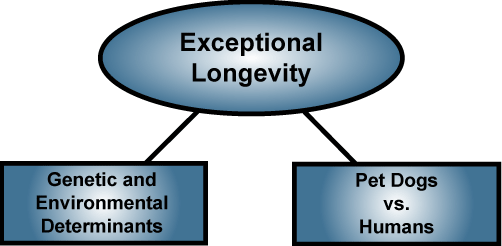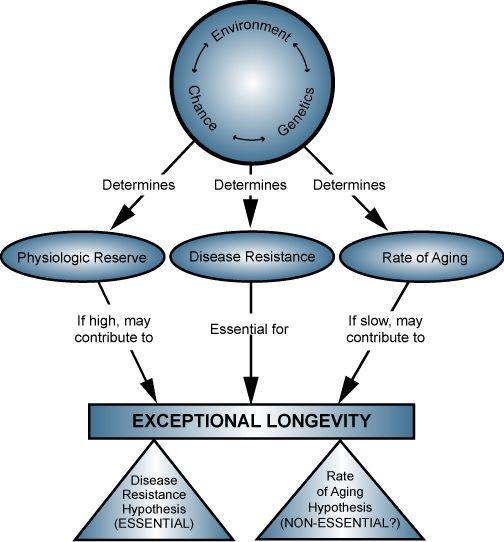
Critical Knowledge Gaps in the Biology of Aging
-
Biomarkers, biomarkers, biomarkers
-
Relevance of model systems to human aging
-
Why old tissues are more vulnerable to disease
-
Whether a slow rate of senescence is essential for exceptional longevity
Research conducted by investigators at The Center for Exceptional Longevity Studies is addressing these critical knowledge gaps.
Key Research Questions on Exceptional Longevity
(Click on question for more details)
- What are the genetic and environmental determinants of exceptional longevity?
- Is exceptional longevity in humans accompanied by resistance to major diseases?
- Are the oldest-old humans cancer resistant?
- What is the nature of cancer resistance in the oldest-old?
- Is exceptional longevity in pet dogs accompanied by resistance to major diseases?
- Are the oldest-old pet dogs cancer resistant?
A Conceptual Model of Factors that Contribute to Exceptional Longevity
This model was developed by scientists at The Center for Exceptional Longevity Studies based upon what we have learned about the oldest-old pet dogs and humans. It appears in the Journal of Gerontology (Cooley et al, J Gerontol 2003).
Comparison of Extreme Aged Rottweiler Dogs and Human Centenarians
(Cooley et al, J Gerontol 2003)
| Age at Death | ≥ 13.3 years | ≥ 100 years |
| Gender | ||
| Female | 67% | 80% |
| Cause of Death | ||
| Cancer | 19% | 4% |
| Non-cancer | 81% | 96% |
| Delay in Onset of Major Diseases | ||
| Survivor | 24% | 38% |
| Delayer | 19% | 43% |
| Escaper | 57% | 19% |

